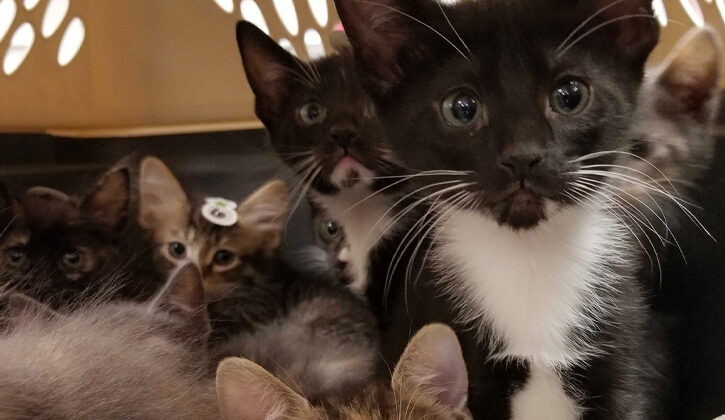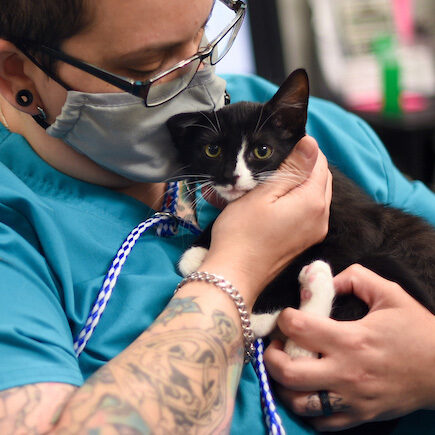Community Cats

Community cats, strays and owned pet cats are all members of the same species: they are all domestic cats. But community cats and stray cats also differ from one another in a very important way - in their relationships and interactions with people.
A stray cat is a domestic cat that has been abandoned or has strayed away from home and become lost. A community cat is a cat who has never had contact with humans or has had diminished contact with humans over time. Both of these cats can live outside in the company of other cats like them.
Since it is difficult to determine whether the cat you might want to help is either a stray or a community cat we advise that you treat them similarly - approach with caution and observe before you try to interact.
One of the best ways to help community cats and strays is through TNR (Trap/Neuter/Return or Release) which means bringing the cat in a trap to have them spayed or neutered and vaccinated. When a community cat or stray is spayed or neutered we will tip their left ear so they can easily be identified as fixed.
Traps
Because community cats and stray cats do not always like to be touched, they must be admitted for surgery in a humane trap. We are happy to provide a trap if needed. Before picking up a trap from one of our locations, we recommend that you call us at (704) 970-2711 or email tnr@standforanimals.org. to make sure that one is available at the clinic location that is most convenient to you. We will give you instructions on how to operate the trap.
Traps are sometimes available at Friends of Feral Felines. You can reach them at (704) 348-1578.
Please do not put blankets, newspapers or towels on the inside of the trap. Once the cat is trapped the trap should be covered with a blanket, sheet or towel and kept in a warm, dark place until the cat is brought in for surgery.
Please keep the trap covered when transporting the cat to the clinic. We also recommend that you bring a hard carrier (not trap) for the cat to recover in after surgery. They can recover in the trap if needed.
Please do not trap when it is extremely hot or cold.
Surgery Days
Community cats must be scheduled prior to coming in by requesting a spay neuter appointment through our online scheduler. The scheduler opens on the 10th of every month for the following month. (Example: July 10th the schedule opens up for August spay neuter appointments.)
You may schedule two cats per surgery day. There is no penalty if you are unable to trap on your scheduled date. Please email tnr@standforanimals.org with questions.
Please bring an extra carrier with you for the cat to recover in. It is uncomfortable for the cat to be placed in a trap after surgery.
Because they cannot be handled prior to being anesthetized, community cats are not given a pre-surgical exam. When you drop the cat off at the clinic you will be asked to complete a surgical release.
What to Expect the Day of Surgery
On the day of surgery, you will drop the cat at one of the clinic sites at 7:30 am. You will be asked to complete a surgical release before you are check-in. Once your paperwork is complete and you have checked in at the desk your pet will be admitted. Pick up is the next morning at 8:30 am unless otherwise noted. You will pay when you check out and receive post-op instructions and medication. Don’t forget to bring an extra carrier!
Cats receive a long-acting pain medication that lasts for several days so they do not need at-home pain medication administered post-op.
North Carolina law requires that all cats that are fixed have a current rabies vaccination. Community cats will be given a rabies vaccination and a feline distemper (FVRCP) on the day of surgery. We also recommend giving a Feline Leukemia vaccination (FELV) ($15) as well. Some trappers choose to combo test their community cats. A combo test is a blood test that can determine if a cat has FIV or feline Leukemia. Stand For Animals does not automatically euthanize community cats that test positive. This decision is made on an individual basis and in consultation with the trapper. Trappers will be contacted if the Veterinarian determines euthanasia was the most humane medical decision.
All community cats are ear-tipped at the time of surgery. Ear-tipping facilitates the identification of these cats as being fixed and prevents them from being picked up again to be spayed/neutered.
Once Your Community Cat Is Home
Once you pick up the cat, we recommend you keep the cat indoors for as long as possible without causing the cat to be stressed.
Let Us Help Answer Your Questions
-
How do I know if my cat is a community cat?
Community cats is an umbrella term that includes stray, feral, lost or abandoned cats. A community cat is a cat that primarily lives outside, does not like to be handled and receives intermittent care.
-
I have a cat that lives outside, but it lets me pet it. Can I bring it to the clinic in a regular carrier and still receive community cat pricing?
No. In order to receive community cat pricing, you must bring the cat in a trap and agree to have the cat ear-tipped.
-
How long should I let my community cat recover inside?
The longer the cat can be held inside the better they will heal, but if the cat is in great distress being kept inside you may release it in the area you found it.
-
Should I get an e-collar for my community cat?
No. As most community cats are not tamed and cannot be handled, we do not recommend that you try to put an e-collar on them.
-
How many community cats can I bring in at once?
We request that you bring in no more than two community cats at once as it is difficult to transport and manage the recovery of more than two cats at a time.



